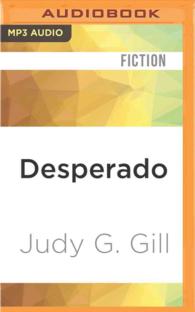- ホーム
- > 洋書
- > 英文書
- > Literary Criticism
基本説明
Distinguished scholar argues that we need a practical branch of the humanities which functions similarly to technology and politics, but is specific to the cultural domain.
Full Description
Distinguished scholar Mikhail Epstein offers a re-assessment of the role of the humanities and advocates their constructive potential for the society and intellectual culture of the future.
In his famous classification of the sciences, Francis Bacon not only catalogued those branches of knowledge that already existed in his time, but also anticipated the new disciplines he believed would emerge in the future: the "desirable sciences." In this open access publication, Mikhail Epstein echoes, in part, Bacon's vision and outlines the "desirable" disciplines and methodologies that may emerge in the humanities in response to the new realities of the twenty-first century. Are the humanities a purely scholarly field, or should they have some active, constructive supplement? We know that technology serves as the practical extension of the natural sciences, and politics as the extension of the social sciences. Both technology and politics are designed to transform what their respective disciplines study objectively.
The Transformative Humanities: A Manifesto addresses the question: Is there any activity in the humanities that would correspond to the transformative status of technology and politics? It argues that we need a practical branch of the humanities which functions similarly to technology and politics, but is specific to the cultural domain.
The ebook editions of this book are available open access under a CC BY-NC-ND 4.0 license on bloomsburycollections.com.
Contents
Acknowledgments
Foreword, by Caryl Emerson (Princeton University)
Introduction
Part One. An Open Future
Chapter 1. From Post- to Proto-: Toward a New Prefix in Cultural Vocabulary
Chapter 2. Chronocide: A Prologue to the Resurrection of Time
Chapter 3. Mikhail Bakhtin and the Future of the Humanities
Part Two. Humans and Texts
Chapter 4. Reconfigurations of Textuality
Chapter 5. " ". Ecophilogy: Text and its Environment
Chapter 6. Semiurgy: From Language Analysis to Language Synthesis
Chapter 7. Scriptorics: An Introduction to the Anthropology and Personology of Writing
Part Three. Humans and Machines
Chapter 8. The Fate of the Human in the Posthuman Age
Chapter 9. The Art of World-Making and the New Vocation for Metaphysics
Chapter 10. Information Trauma and the Evolution of the Human Species
Chapter 11. Horrology: The Study of Civilization in Fear of Itself
Part Four. Humans and Humans
Chapter 12. Universics: From Relativism to Critical Universality
Chapter 13. Micronics: The Study of Small Things
Chapter 14. From Body to Self: What Is It Like To Be What You Are?
Chapter 15. Differential Ethics: From the Golden Rule to the Diamond Rule
Part Five. The Future of Wisdom. Creative Theory
Chapter 16. What Is 'The Interesting?'
Chapter 17. Philosophy's Return to Wisdom
Chapter 18. Logos and Sophia: Sophian Disciplines
Chapter 19. The Philosophy of the Possible and the Possibilities of Philosophy
Chapter 20. The Mass of Knowledge and the Energy of Thinking In Place of a Conclusion: A New Introduction to Future Thinking
Glossary
References
Index







